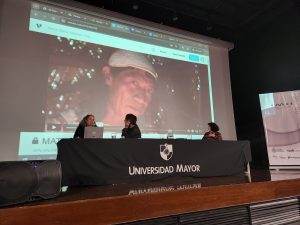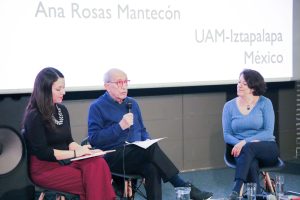Over 300 people attended the first Interdisciplinary Seminar: “Musical and Sound Cultures in Chile and Latin America.”
The first Interdisciplinary Seminar, “Musical and Sound Cultures in Chile and Latin America,” was held with great success between June 4 and 6. It was organized by the CMUS Millennium Nucleus in conjunction with the Ministry of Culture, Arts and Heritage and its Community Culture Points program, the Master’s in Latin American Anthropology at Alberto Hurtado University, La Moneda Cultural Center, Mayor University, and the Museum of Pre-Columbian Art.
This event established itself as an important forum within Latin America for cultural studies of music and listening. The seminar concluded with the Conference Where does this lead? Cultural policies when there’s more to the state than just citizens. conducted by Néstor García Canclini and Ana Rosas Mantecón (Autonomous Metropolitan University, Mexico).
Symposium on Acoustic Violence and Sound Worlds in Conflict

This Symposium, also part of the Interdisciplinary Seminar, was held on June 4th, jointly organized by NIMSE-U. Mayor. Three panels were held there with national and international researchers such as Luis Achondo (Chile), Rossana Lara (Mexico), Oriana Bernasconi (Chile), Rodrigo Suárez (Chile), Natalia Bieletto (Chile/Mexico), Ana Lidia Domínguez (Mexico), and Felipe Trotta (Brazil). The Symposium concluded with a lecture by Ana María Ochoa (Colombia/USA) entitled “Sound Extractivisms and the Military-Industrial Aural Complex.”
“It was a good opportunity for specialists to discuss and identify theoretical concepts relevant to the social reality of Latin America, and it gave us many opportunities to further explore how epistemological conflicts are being configured—that is, the interpretations of conflicting sound worlds and what this has to do with the social reality of the Latin American continent, its colonial history, etc. The researchers were grateful for the opportunity and the good working environment, and for the theoretical depth we were able to achieve through the various meetings,” explains Natalia Bieletto, CMUS associate researcher and organizer of the event.
Training work
On Wednesday the 5th, the CMUS training project was carried out, where thesis students from the Nucleus participated in workshops with Ana María Ochoa (Colombia/USA). There, the ethnomusicologist met with more than twenty researchers and thesis students in the field.
In this activity, the thesis students had to read two articles by the researcher, and based on these texts, an open conversation ensued in which people from various academic levels participated, such as undergraduate, master’s, and doctoral students from different Chilean universities associated with the Nucleus.
“This resulted in a very rewarding conversation as it touched on a wide range of topics, given the diversity of Ana María Ochoa’s research proposal, which intersects with disciplines as diverse as ecology and the development of military weapons, among many others. The discussion led to very profound topics related to the environment, power, and themes linked to sound and listening. I believe this was the most important achievement of these workshops, as discussing academic texts with this level of deep reflection, with an author of Ana María Ochoa’s caliber, is unique,” says Daniela Fugellie, principal investigator at CMUS and who coordinated this event along with Andrea Chamorro, also principal investigator at CMUS.
III National Encounter of Traditional and Folkloric Music
This encounter took place in the first week of June. Now in its third year, it featured lectures by Pablo Catrileo (Chile) and Rossana Lara (Mexico), as well as presentations by international guests such as Ana María Ochoa (Colombia/USA) and Felipe Trotta (Brazil), who also participated in activities held at the Pontifical Catholic University of Valparaíso.
Rossana Lara’s (Mexico) keynote address was held at the Museum of Pre-Columbian Art and was titled: “Political Ecology of Music from the Multiple Bodies of the Huichol Violin.” She shared her experiences with this instrument and its impact in Latin America.
Visit of Néstor García Canclini and Ana Rosas Mantecón

On Thursday, June 6, the seminar concluded with the panel “Cultural Policies from Below. Experiences Through Music,” where guests from various national cultural groups and initiatives reflected on their experiences and shared with the audience their approach to how music makes it possible to develop cultural policies from a citizen perspective. The panel concluded with a discussion moderated by CMUS researchers Laura Jordán and Eileen Karmy, and featured guests such as Rosario Bravo (Community Choirs); Andrés Pérez (Conchalí Big Band); Rodrigo Montes (COLCHI); Lakitas Matriasaya; Franco Toro (Enrique Soro School); and Maribel Rodríguez (Gremio Recreativo Samba School).
The Keynote Lecture was then held “Where does this lead? Cultural policies when there’s more to the state than just citizens. , led by Néstor García Canclini and Ana Rosas Mantecón (Metropolitan Autonomous University, Mexico). The session focused on the democratization of culture and participatory democracy, as well as the transformations facing institutions and the sociocultural movements that have occurred since the pandemic. The activity was moderated by Carla Pinochet, the alternate director of CMUS and director of the Master’s in Latin American Anthropology.


